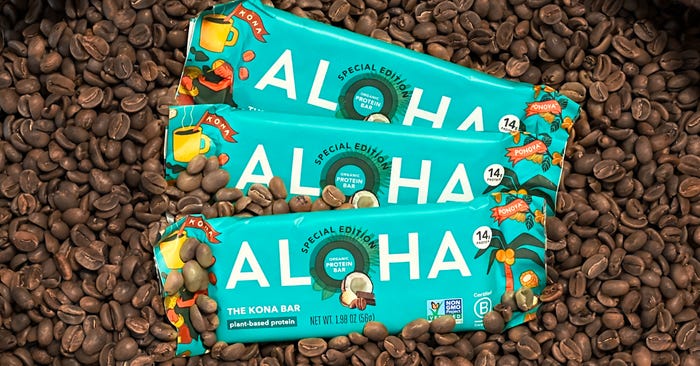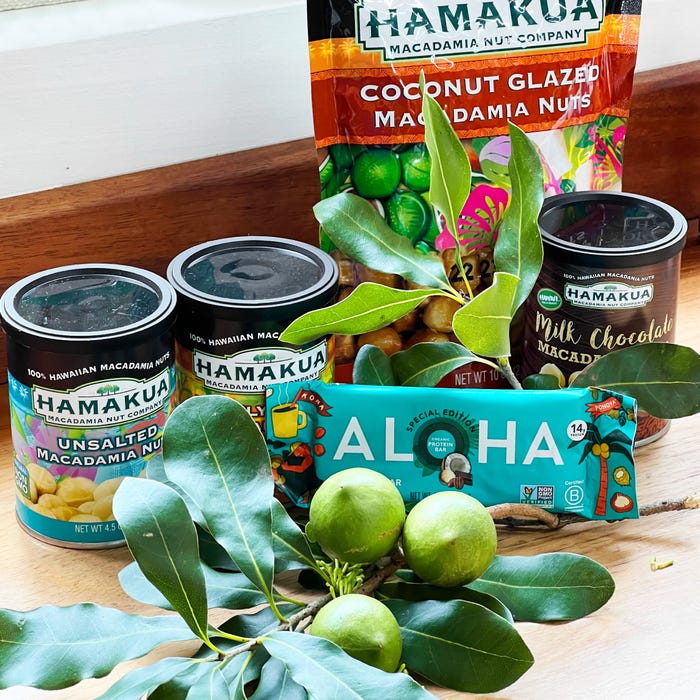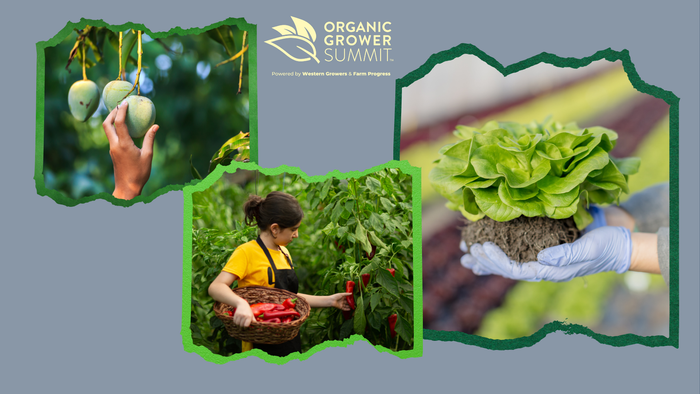Aloha partners with Terviva for the sustainability win
CEO Brad Charron talks sustainability, sourcing, novel ingredient (Ponova oil!) and the recent NEXTY finalist recognition for this mission-forward brand.
October 25, 2023

As more consumers become simultaneously focused on wellness and environmental sustainability, they’re keener to buy products that support both goals. The Aloha Kona Bar fits right into that ethos, with its minimal and carefully sourced ingredients that include a new oil, Ponova, made from the beans of the pongomia tree in Oahu, Hawaii. Add to that Aloha’s recent climate neutral certification and its dedication to donating 10% of proceeds to Hawaii’s leading conservation nonprofit for young people and you have a recipe for Aloha Kona Bar’s Best New Plant-Focused Product finalist win.
New Hope caught up with Aloha CEO Brad Charron to chat about the recognition. Charron has spent most of his career in what he calls the “better food” business. He took the lead at Aloha in 2017; the company refers to him as the “re-founder.” Since assuming the Aloha helm, Charron has concentrated on responsible ingredient sourcing and conscious food design, which he says play a critical role in future-proofing a business. Indeed, one of the major issues people tend to have with plant-based products comes down to taste. Charron made sure to address that off that bat.
“In taking the reins at Aloha, a plant-based pioneer, I made sure the quality, taste, superior macronutrients and premium, traceable ingredients were the stars of the show,” he tells New Hope. “It’s the sum of the parts that makes it special and truly differentiated.”
Read on for more insight from Charron in this lightly edited Q&A.

What was your reaction when you learned Aloha Kona Bar landed the NEXTY finalist win?
Brad Charron: Thrilled! How can you not be thrilled? And not only because it was an obvious win for Aloha but, honestly, because it was an acknowledgement from a broader food community (that we greatly respect) that allowed us to amplify awareness for the farmers, communities and ingredients of Hawai’i that made this bar possible in the first place.
How do you plan to capitalize on your NEXTY award recognition? Please discuss any details around how Aloha will use this award to increase market share.
BC: We’re honored to have that NEXTY recognition and have been sharing it with our community on and offline. It’s a great validator for retail partners, in particular, that Aloha is the brand to bet on, the product to bet on, the people to bet on. This award is awesome and humbling! We know the strict judging criteria. But, as a company, we’re really just going to keep on keeping on in our quest to get more people to meet us. Increased market share will come naturally through continued hard work and operating with the purpose we’ve had since our founding.
What more you have learned about or done with Ponova oil since the various interviews you gave earlier this year? What’s potentially new with this ingredient itself, especially as it relates to Aloha and its business model, and the NEXTY finalist recognition?
BC: Since we launched the Kona Bar back in March, Terviva, the innovative re-generative agriculture company behind Ponova oil, has received global recognition for the work that its doing, including being a finalist for FastCo’s “World Changing Ideas,” and the opportunity to showcase at Climate Week NYC 2023.
Aloha is Terviva’s first ingredient partner and the Kona Bar continues to provide tangible proof of the possibilities that Pongamia trees present for shifting our industry and serving the needs of the planet. If in-stock conditions are any indication of momentum, Kona Bars continue to be in extremely high demand on Aloha.com and through our partners at Thrive Market and Vitacost. We actually sold out completely back in August while running an enhanced Maui Wildfire Relief program that donated 50% of all proceeds of the bar to support our philanthropic partner on Hawai’i, Kupu, and its relief efforts. Literally, I was out of stock in my own household.
On a very similar note, without revealing any secret sauce/strategy, what’s Aloha planning next when it comes to incorporating Ponova oil into its products?
BC: Sorry! You’ll have to wait as we continue our product development work for 2024 and beyond. Ponova oil has a special place in my heart considering the exceptional texture it provides our bars and the broader impact that it allows us to propagate in the food industry. Plus, Terviva’s Founder, Naveen Sikka, and I have been friends for over 23 years so I can’t imagine he’ll let me forget about it.

What about the contributions of Hamakua Nut Company and Greenwell Farms, which grow the macadamia nuts and coffee, respectively, for the Aloha Kona Bar. How did they help Aloha Kona Bar cinch its NEXTY finalist status?
BC: First off, our company was absolutely humbled to partner with them both—the only mac nut grown on Hawai’I and a fifth-generation Kona coffee farm. It was so important for them to see us ‘eye to eye,’ spend time with me face-to-face, and know that this wasn’t some marketing ploy to create deeper connections between growers on the islands and a mainstream food brand. We mean what we say. Period. Our ability to share the quality and taste of these premium ingredients sourced from their farms with a broader audience was a huge win for everyone (consumers included), NEXTY aside. Getting recognized for it on a bigger New Hope stage was icing on the cake. Look, I think the fact that New Hope understood the magic of these ingredients and, as industry insiders, recognized how incredibly challenging it was to produce a hyper-locally sourced, ‘craft’ product at any kind of production scale, was another thing that helped us.
As you talk with more people at trade shows and other venues, what kind of reception are you hearing when they understand that Aloha Kona Bars contain Ponova oil, with its sustainability benefits?
BC: The food industry loves the word ‘new’—always has, always will. So, everyone is obviously curious about any new ingredient that boasts the holistic benefits that the pongamia beans provide. At Expo West, at NYC Climate Week, even in the headquarters of various retailer partners, once we explain the impact of Ponova oil and what Terviva is doing to help the environment on a micro and macro level, [others] can’t help but be impressed and excited about its potential and additional use cases. Oh, and did I mention it helps make Aloha Kona Bars delicious? Honestly, the fact that the ingredient itself is a perfect complement to our existing Aloha food philosophy is what takes this partnership up a notch.

What one question do you wish more people would ask about Aloha Kona Bar (and why)?
BC: The magic of the Kona bar really comes to life at the farms in Hawai’i where the unique ingredients were sourced. Take Hamakua Macadamia Nut company, for example. It runs most of its farm and processing plant from a combination of hydro energy and biofuel. It takes care of its workers who do the hard labor collecting the mac nuts from the orchards. The level of care that is put into caring for its land, and that of the larger community in Hawai’i is truly inspiring. I wish the question was asked, “So how do I get there on Google Maps?” Easy answer. Town of Pahala, ‘Big Island.’
On a similar note, what one question do you wish more people would ask about Ponova oil (and why)?
BC: We, as an industry, have been talking about sustainable agriculture for a while now but there’s a lot of reasons new ingredients have a tough time gaining broad stream market acceptance. Some are related to costs to produce, to distribute, etc. Those are legitimate concerns in a world where even start-up companies have to operate as financially sound businesses. But what’s so incredible about pongamia trees is that they are imminently adaptable and sustainably harvested as an excellent regenerative crop. The trees sequester carbon and produce nitrogen, so they’re improving the quality of the soil that they grow in. They also require very little water and fertilizer to grow, making them a great option for farming in areas where other crops don’t grow. They’re very practical. I hope that practicality aids adoption on a broader scale and a faster time horizon. We’ll all benefit from that.
About the Author
You May Also Like

.jpg?width=700&auto=webp&quality=80&disable=upscale)
